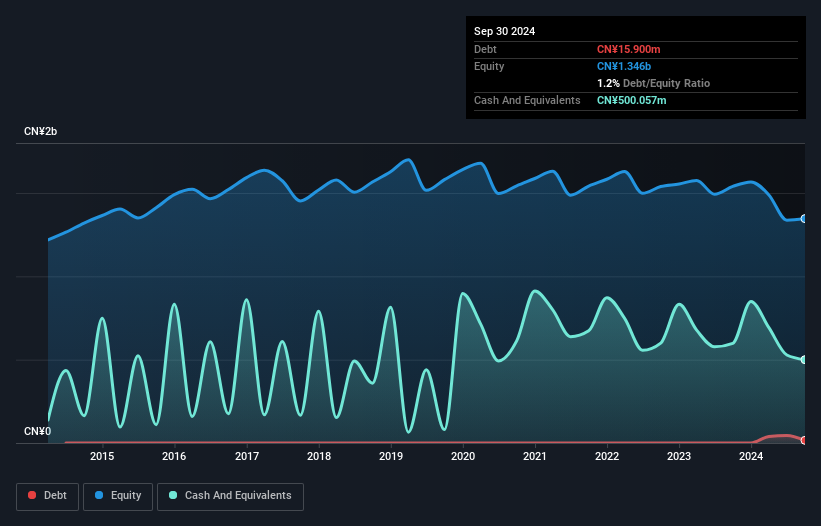The external fund manager backed by Berkshire Hathaway's Charlie Munger, Li Lu, makes no bones about it when he says 'The biggest investment risk is not the volatility of prices, but whether you will suffer a permanent loss of capital.' So it might be obvious that you need to consider debt, when you think about how risky any given stock is, because too much debt can sink a company. Importantly, Tungkong Inc. (SZSE:002117) does carry debt. But the real question is whether this debt is making the company risky.
When Is Debt Dangerous?
Debt and other liabilities become risky for a business when it cannot easily fulfill those obligations, either with free cash flow or by raising capital at an attractive price. If things get really bad, the lenders can take control of the business. However, a more usual (but still expensive) situation is where a company must dilute shareholders at a cheap share price simply to get debt under control. Having said that, the most common situation is where a company manages its debt reasonably well - and to its own advantage. The first thing to do when considering how much debt a business uses is to look at its cash and debt together.
View our latest analysis for Tungkong
What Is Tungkong's Net Debt?
The image below, which you can click on for greater detail, shows that at September 2024 Tungkong had debt of CN¥15.9m, up from none in one year. However, its balance sheet shows it holds CN¥500.1m in cash, so it actually has CN¥484.2m net cash.

How Healthy Is Tungkong's Balance Sheet?
Zooming in on the latest balance sheet data, we can see that Tungkong had liabilities of CN¥489.9m due within 12 months and liabilities of CN¥37.7m due beyond that. Offsetting these obligations, it had cash of CN¥500.1m as well as receivables valued at CN¥343.3m due within 12 months. So it can boast CN¥315.7m more liquid assets than total liabilities.
This surplus suggests that Tungkong has a conservative balance sheet, and could probably eliminate its debt without much difficulty. Succinctly put, Tungkong boasts net cash, so it's fair to say it does not have a heavy debt load!
It is just as well that Tungkong's load is not too heavy, because its EBIT was down 40% over the last year. Falling earnings (if the trend continues) could eventually make even modest debt quite risky. There's no doubt that we learn most about debt from the balance sheet. But it is Tungkong's earnings that will influence how the balance sheet holds up in the future. So when considering debt, it's definitely worth looking at the earnings trend. Click here for an interactive snapshot.
Finally, a company can only pay off debt with cold hard cash, not accounting profits. Tungkong may have net cash on the balance sheet, but it is still interesting to look at how well the business converts its earnings before interest and tax (EBIT) to free cash flow, because that will influence both its need for, and its capacity to manage debt. Happily for any shareholders, Tungkong actually produced more free cash flow than EBIT over the last three years. That sort of strong cash generation warms our hearts like a puppy in a bumblebee suit.
Summing Up
While we empathize with investors who find debt concerning, you should keep in mind that Tungkong has net cash of CN¥484.2m, as well as more liquid assets than liabilities. And it impressed us with free cash flow of CN¥184m, being 106% of its EBIT. So we are not troubled with Tungkong's debt use. When analysing debt levels, the balance sheet is the obvious place to start. But ultimately, every company can contain risks that exist outside of the balance sheet. To that end, you should learn about the 3 warning signs we've spotted with Tungkong (including 2 which are concerning) .
Of course, if you're the type of investor who prefers buying stocks without the burden of debt, then don't hesitate to discover our exclusive list of net cash growth stocks, today.
Valuation is complex, but we're here to simplify it.
Discover if Tungkong might be undervalued or overvalued with our detailed analysis, featuring fair value estimates, potential risks, dividends, insider trades, and its financial condition.
Access Free AnalysisHave feedback on this article? Concerned about the content? Get in touch with us directly. Alternatively, email editorial-team (at) simplywallst.com.
This article by Simply Wall St is general in nature. We provide commentary based on historical data and analyst forecasts only using an unbiased methodology and our articles are not intended to be financial advice. It does not constitute a recommendation to buy or sell any stock, and does not take account of your objectives, or your financial situation. We aim to bring you long-term focused analysis driven by fundamental data. Note that our analysis may not factor in the latest price-sensitive company announcements or qualitative material. Simply Wall St has no position in any stocks mentioned.
About SZSE:002117
Tungkong
Engages in the printing, lamination, and technical service businesses in the People's Republic of China.
Flawless balance sheet established dividend payer.
Market Insights
Community Narratives




